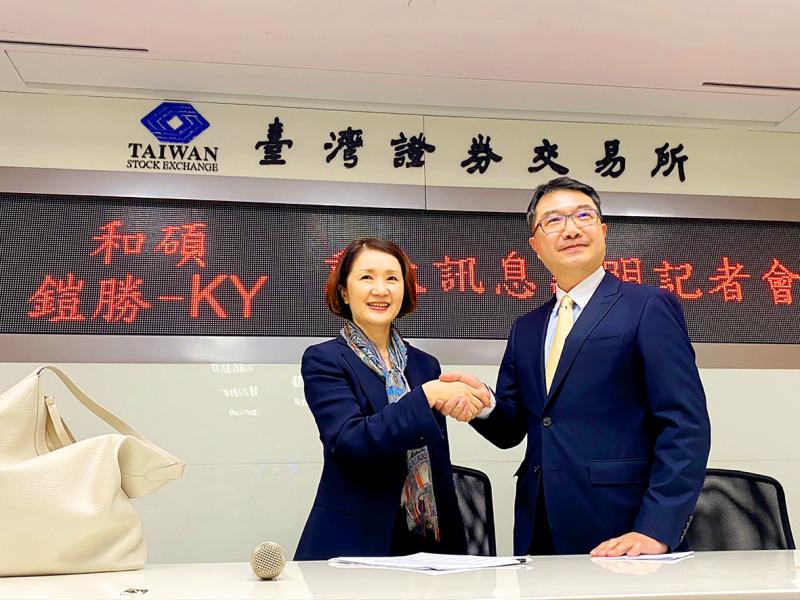Pegatron Corp (和碩), an Apple Inc assembly partner, yesterday said that it would fully absorb metal casing subsidiary Casetek Holdings Ltd (鎧勝) in a NT$14.5 billion (US$490.93 million) deal to improve the companies’ competitiveness in the phone assembly supply chain.
When Pegatron and Casetek suspended trading earlier in the day, speculation swirled that a possible purchase by China’s Luxshare Precision Industry Co (立訊精密) might be in the cards, but the announcement of the merger dispelled any conjecture.
The board of directories of each company agreed that Pegasus Ace Limited, a wholly owned subsidiary of Pegatron, would purchase Casetek in a reverse triangular merger, Pegatron chief financial officer Louise Wu (吳薌薌) told reporters, adding that after Pegasus Ace acquired Casetek, it would be dissolved and Casetek would become a 100 percent subsidiary of Pegatron.

Photo: CNA
“As mid-range brands are increasingly pressured to cost down, we need to be more flexible when it comes to meeting customer needs,” Wu said. “Consolidating Pegatron with Casetek means that we can share staff, resources and business freely, without being bound by our responsibilities to two sets of stockholders.”
Casetek is to be delisted from the local stock market upon completion of the deal. The date for the consolidation is set to be Feb. 26 next year.
The merger with Pegatron would better enable it to coordinate with Casetek, which would help both companies be more competitive, Wu said.
According to a joint statement, Pegatron is to buy Casetek common stock at a price of NT$87.5 per share, implying a 21.4 percent premium over Casetek’s average share price over the past 10 trading days.

Sweeping policy changes under US Secretary of Health and Human Services Robert F. Kennedy Jr are having a chilling effect on vaccine makers as anti-vaccine rhetoric has turned into concrete changes in inoculation schedules and recommendations, investors and executives said. The administration of US President Donald Trump has in the past year upended vaccine recommendations, with the country last month ending its longstanding guidance that all children receive inoculations against flu, hepatitis A and other diseases. The unprecedented changes have led to diminished vaccine usage, hurt the investment case for some biotechs, and created a drag that would likely dent revenues and

Global semiconductor stocks advanced yesterday, as comments by Nvidia Corp chief executive officer Jensen Huang (黃仁勳) at Davos, Switzerland, helped reinforce investor enthusiasm for artificial intelligence (AI). Samsung Electronics Co gained as much as 5 percent to an all-time high, helping drive South Korea’s benchmark KOSPI above 5,000 for the first time. That came after the Philadelphia Semiconductor Index rose more than 3 percent to a fresh record on Wednesday, with a boost from Nvidia. The gains came amid broad risk-on trade after US President Donald Trump withdrew his threat of tariffs on some European nations over backing for Greenland. Huang further

CULPRITS: Factors that affected the slip included falling global crude oil prices, wait-and-see consumer attitudes due to US tariffs and a different Lunar New Year holiday schedule Taiwan’s retail sales ended a nine-year growth streak last year, slipping 0.2 percent from a year earlier as uncertainty over US tariff policies affected demand for durable goods, data released on Friday by the Ministry of Economic Affairs showed. Last year’s retail sales totaled NT$4.84 trillion (US$153.27 billion), down about NT$9.5 billion, or 0.2 percent, from 2024. Despite the decline, the figure was still the second-highest annual sales total on record. Ministry statistics department deputy head Chen Yu-fang (陳玉芳) said sales of cars, motorcycles and related products, which accounted for 17.4 percent of total retail rales last year, fell NT$68.1 billion, or

MediaTek Inc (聯發科) shares yesterday notched their best two-day rally on record, as investors flock to the Taiwanese chip designer on excitement over its tie-up with Google. The Taipei-listed stock jumped 8.59 percent, capping a two-session surge of 19 percent and closing at a fresh all-time high of NT$1,770. That extended a two-month rally on growing awareness of MediaTek’s work on Google’s tensor processing units (TPUs), which are chips used in artificial intelligence (AI) applications. It also highlights how fund managers faced with single-stock limits on their holding of market titan Taiwan Semiconductor Manufacturing Co (TSMC, 台積電) are diversifying into other AI-related firms.